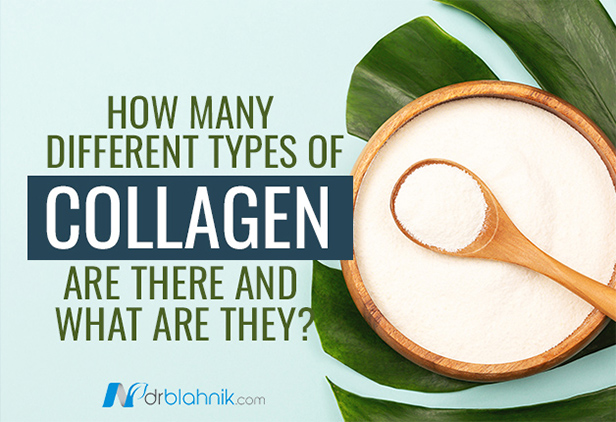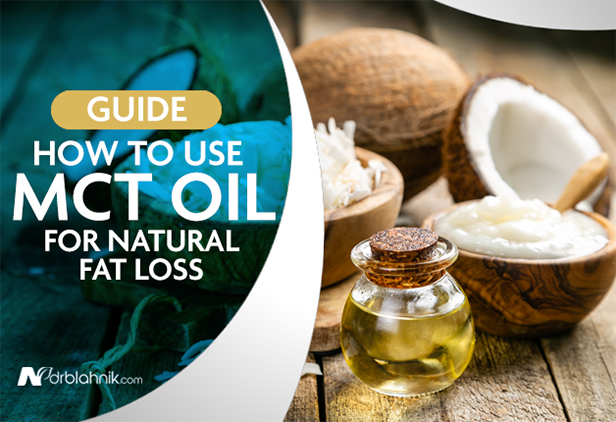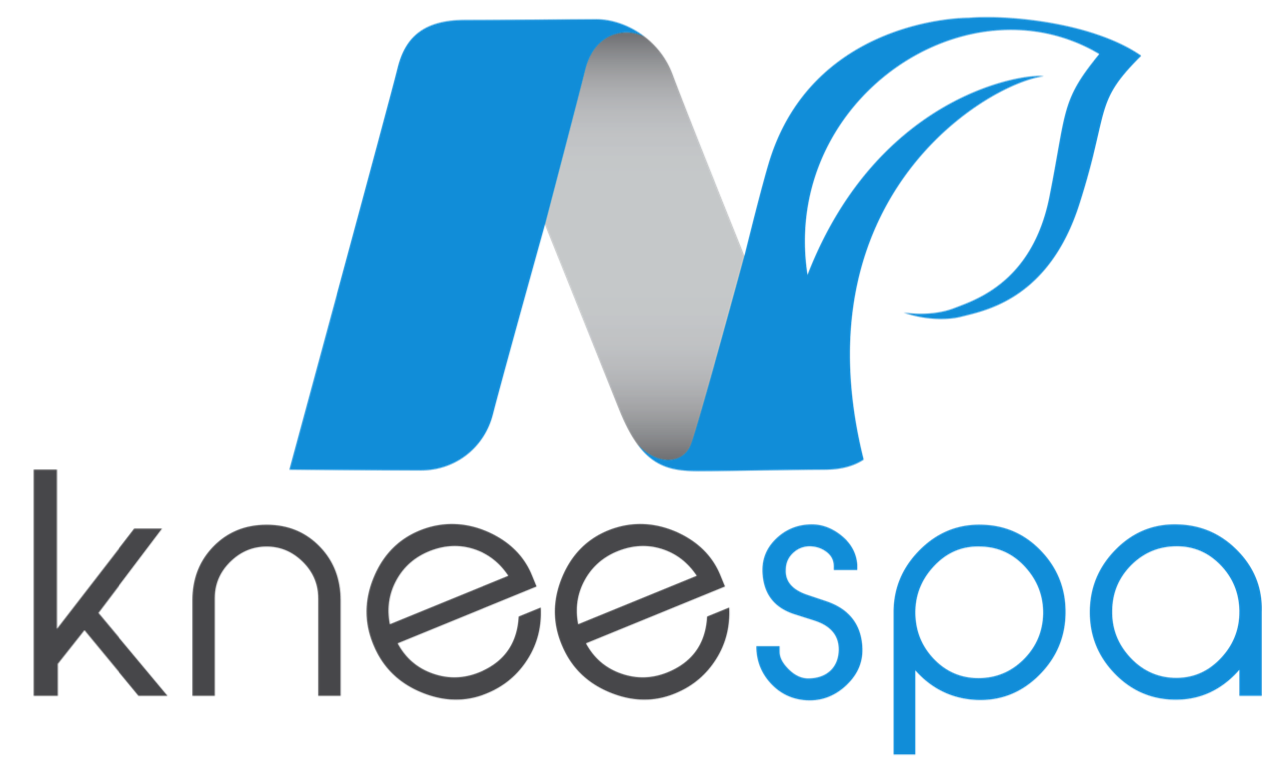As a species, humanity is reliant on proteins to function properly. There are dozens of proteins our bodies process to ensure the healthiest standard for our body. One of these proteins, known as collagen, is one of the most expansive and simultaneously important proteins to our body. However, the sheer number of collagen types is so expansive that only a small number of them can be referenced in this article. So, we hope to help you learn about these collagen types, general collagen information, and how to get the collagen you need.
Table of Contents
What is Collagen?
Collagen is not difficult to categorize despite the numerous variants. All collagen is a structural protein that can be found in the bodies of all small animals. Collagen makes up one-third of the proteins in the human body. It is one of the main building blocks of bones, tendons, skin, muscles, and ligaments in the human body and can even be found in other parts like teeth. There are twenty-eight identified variations of collagen that have been discovered, though we will only be discussing six in this article. Each collagen type does fall under one of two categories: fibrillar and non-fibrillar.
Fibrillar collagen provides the body with three-dimensional frameworks for tissue and organs. Non-fibrillar collagen forms triple-helical monomeric units to modify fibers and form filaments. The different collagens, in general, can be categorized as follows:
Fibrillar Collagens:
- Type I
- Type II
- Type III
- Type V
- Type XI
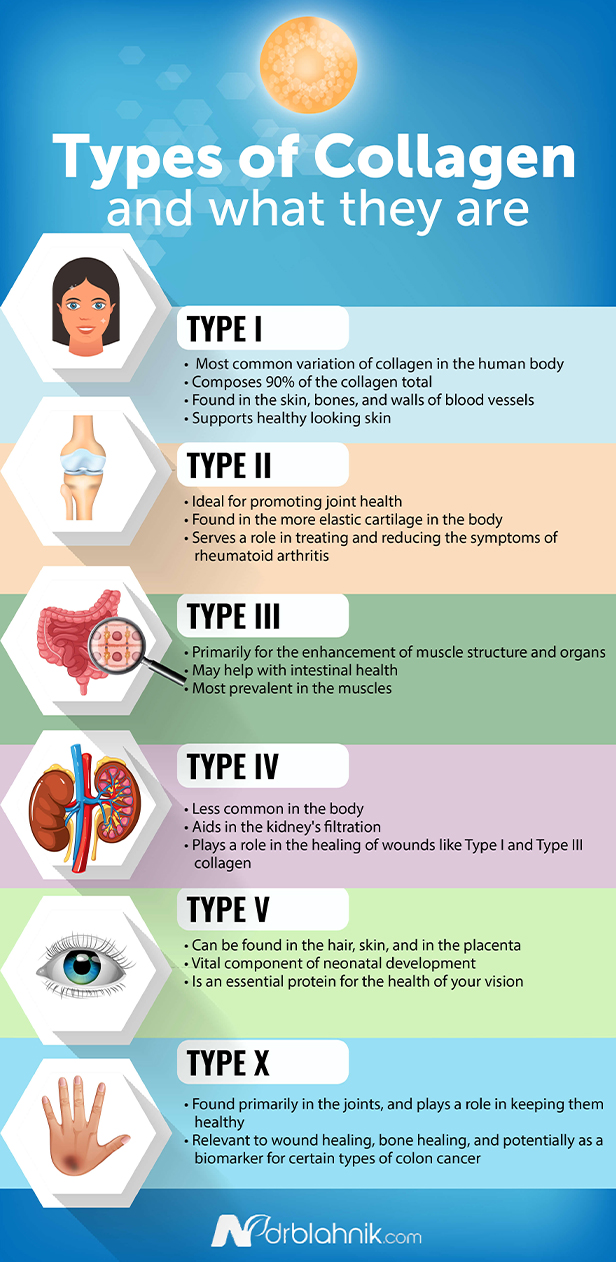
Non-Fibrillar Collagens:
- FACIT Collagens (Type IX, Type XII, Type XIV, Type XIX, and Type XXI)
- Short Chain Collagens (Type VIII and Type X)
- Basement Membrane Collagen (Type IV)
- Multiplexin Collagens (Type XV and Type XVIII)
- MACIT Collagens (Type XIII and Type XVII)
- Microfibril Forming Collagens (Type VI)
- Anchoring Fibril Collagens (Type VII)
Collagen is derived from the Greek word “kólla,” which translates to “glue.” A fitting term seeing as collagen works to keep the body glued together. However, after the age of 25, the human body begins declining in its production of collagen. While this is a natural occurrence, it causes the body’s physical appearance to deteriorate. This is best exemplified by the wrinkling of the skin and the diminishment of cartilage in the knees. The general role of collagen is to keep the body together, but each collagen variation has a different method of doing so.
Type I Collagen
A form of fibrillar collagen, Type I collagen is the most common variation of collagen in the human body, composing 90% of the collagen total. Type I collagen is found in the skin, bones, and walls of blood vessels, as well as connective tissues and fibrous cartilage. A study in 2008 found that Type I collagen is found in scar tissue as well, suggesting that this variation of collagen plays a role in healing wounds and blood clotting.
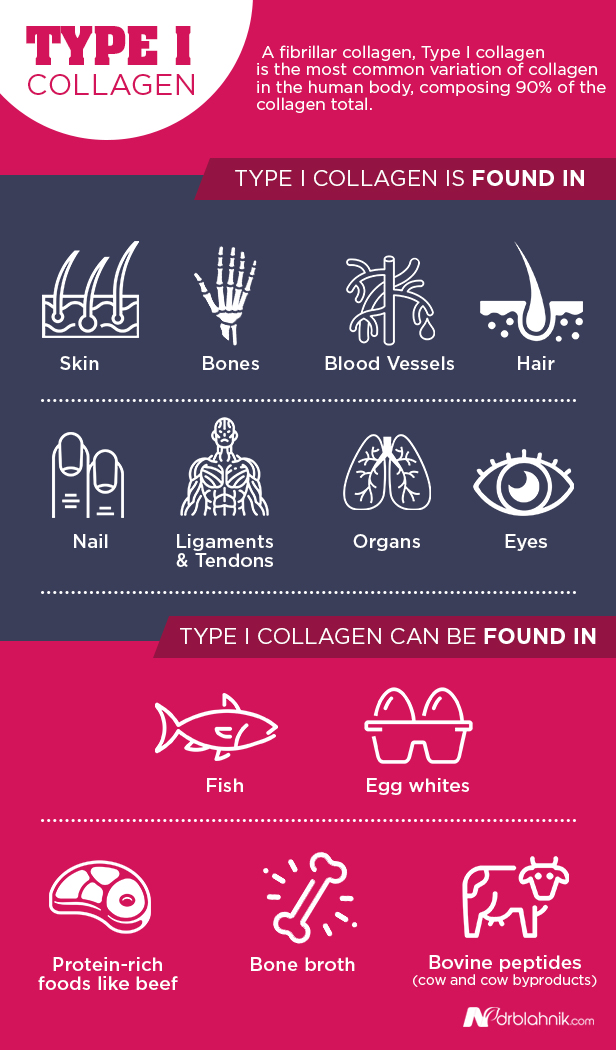
Type I collagen has a practical use for those who are concerned with their image as much as their health. Another study, conducted more recently, found that Type I collagen influences weight management. The study involved providing Type I peptides to 105 women and caused a decline in cellulite in the body even for those in healthy weight ranges.
The most notable trait of Type I collagen is its ability to reduce the impact of aging. Hence the rise of injection clinics that cater to those who can afford the treatments. Type I collagen has an effect that reduces wrinkling of the skin to provide a more youthful appearance to those looking to counteract natural aging.
As for where Type I collagen can be found, there are several sources that help provide a natural way to introduce it into your system:
- Fish or other marine life.
- Egg whites.
- Bovine peptides (cow and cow byproducts).
- Protein-rich foods like beef.
- Bone broth.
Consumption of any of the above can help bolster the levels of Type I collagen in your system to reap the benefits it provides in a more natural and less invasive way. The maintenance of your Type I collagen levels is crucial to keeping your bones and muscles well-defined and healthy.
Type II Collagen
Unlike Type I collagen, Type II collagen is found in the more elastic cartilage in the body and is ideal for promoting joint health. Unlike Type I collagen injections, which cater to the patient’s vanity in most cases, Type II collagen injections serve a higher purpose for people’s health. The only similarity Type II collagen has to Type I collagen is that they are both fibrillar collagens.
A pair of studies discovered that Type II collagen injections serve a role in treating and reducing the symptoms of rheumatoid arthritis. With 150 subjects given Type II collagen for arthritic treatments, only two demonstrated side effects of nausea. Out of the subject pool, 136 showed signs of reduced inflammation in the afflicted joints.
It is worth noting that increasing your intake of Type II collagen can occur before you begin experiencing any sort of joint pain to reinforce against what is coming. As for viable sources of Type II collagen, you can find it in the following:
- Bone broth.
- Chicken.
- Protein-rich foods.
- Multi-collagen protein powders.
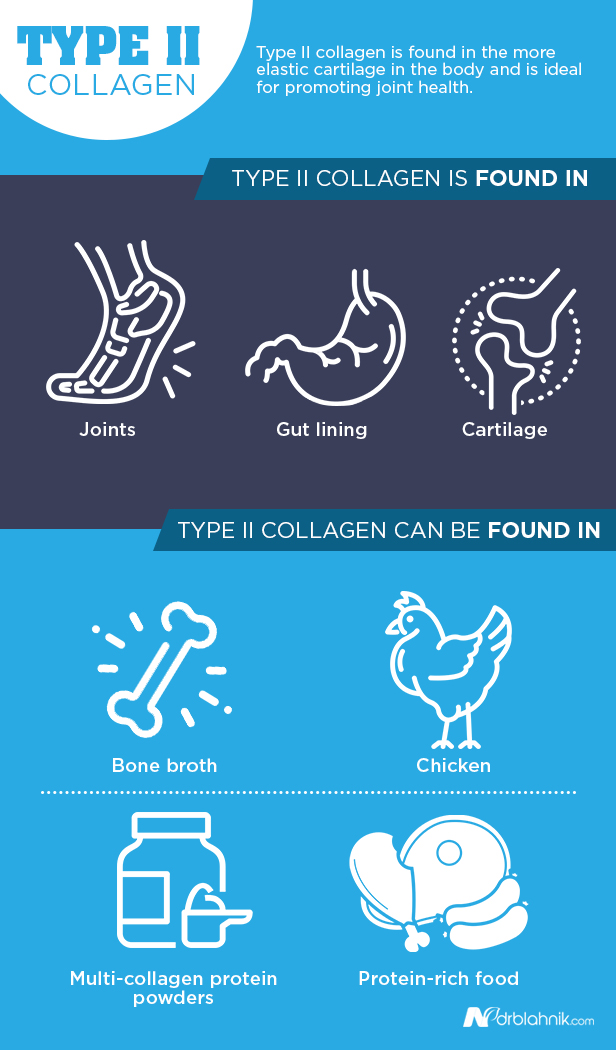
Type II collagen is one of the more useful types of collagen and is extremely important to keep up your health. It is easy to keep this collagen amount up due to chicken being one of the richest and most easily accessible sources of protein.
Type III Collagen
Yet another fibrillar collagen, Type III collagen is primarily for the enhancement of muscle structure and organs. Type III collagen is the second most prevalent collagen in the human body after Type I. It is also located in the intestines, which has led to the belief that Type III collagen helps with intestinal health; however, this benefit is unproven in current medical studies.
Type III collagen facilitates the synthesis of blood platelets. Due to the function of this collagen variant, it is crucial to the body’s ability to clot blood. This renders it functionally like Type I collagen regarding wound healing since Type III collagen clots the blood and Type I collagen is found in scar tissue.
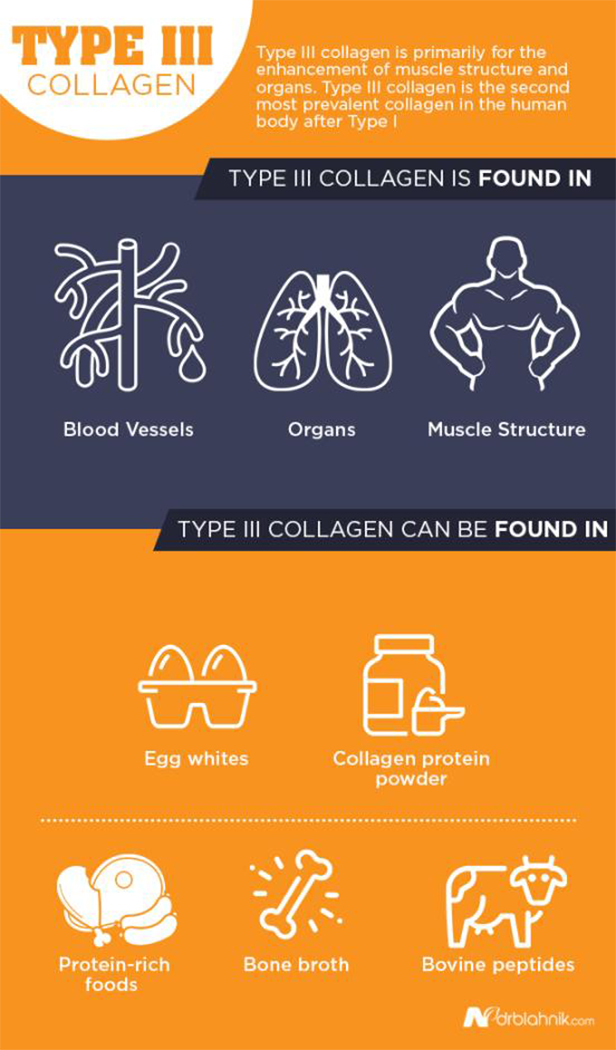
Another potential overlap between Type I and Type III collagen is their effect on your ability to exercise. Type III collagen is most prevalent in the muscles, making its influence on exercise logical. By using and maximizing Type III collagen intake, you can build muscle mass and develop your stature more effectively. If you are seeking effective sources of Type III collagen, you are liable to find it in the following:
- Bovine peptides.
- Protein-rich foods.
- Bone broth.
- Collagen protein powders.
- Egg whites.
It is important to know that a deficiency of Type III collagen can result in serious health issues. A lack of Type III collagen can cause blood vessels to rupture, and a study even found that seven out of fourteen victims of fatal aneurysms had Type III collagen deficiencies.
Type IV Collagen
A non-fibrillar collagen and basement membrane, Type IV collagen is less common in the body. The role it plays is an important one, however. Type IV collagen aids in the kidney’s filtration and is naturally found in the layers of the skin that surround our muscles, organs, and fat cells.
Unlike the previously mentioned collagen variants, Type IV collagen forms in sheets rather than tight helix structures due to lacking the glycine found in other collagens. Type IV collagen forms the basal lamina, the deep layer of the skin, that serves as the upper half of the basement membrane. Due to the role of Type IV collagen in the skin, it plays a role in the healing of wounds like Type I and Type III collagen. Additionally, Type IV collagen also plays a role in forming an embryo during the development cycle of fetuses.
If you are looking to boost your levels of Type IV collagen, you should turn to the following sources:
- Egg whites.
- Protein-rich foods.
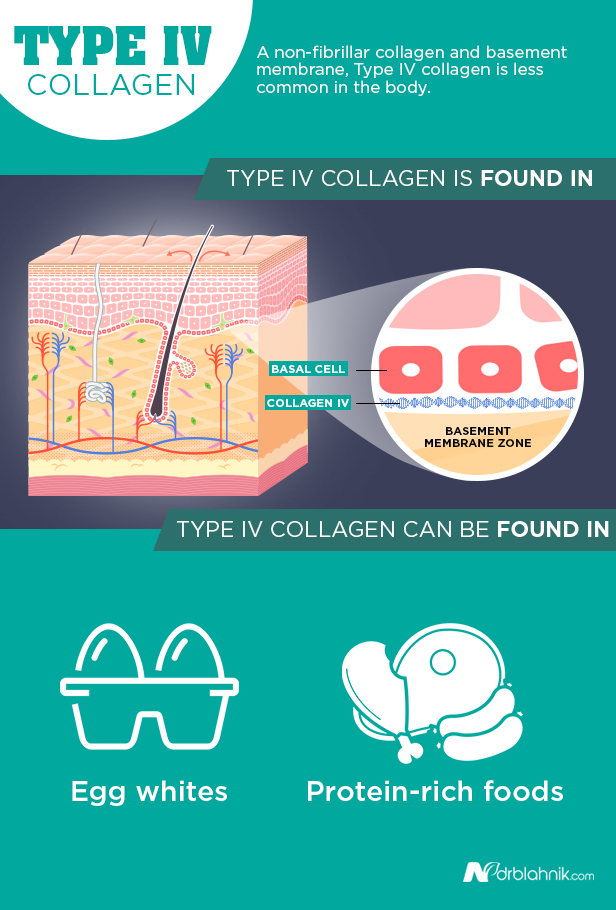
There was a recently discovered potential link between low Type IV collagen levels and digestive disorders, though more study is required to confirm this relationship. Type IV collagen is important to the strength of the skin layer and helping your kidney function, but remains less important than the previously listed variants.
Type V Collagen
Another fibrillar, fiber-like collagen, Type V collagen can be found in the hair and skin, and in the placenta. Type V collagen is a vital component of neonatal development due to its presence and role in the placenta. The placenta, which provides nutrients and oxygen to the embryo, requires Type V collagen to maintain integrity.
Type V collagen is also found in the cornea of the eyes, making it an essential protein for the health of your vision. In fact, studies have found that deficiencies of Type V collagen can negatively impact your vision as the cornea becomes transparent as a result.
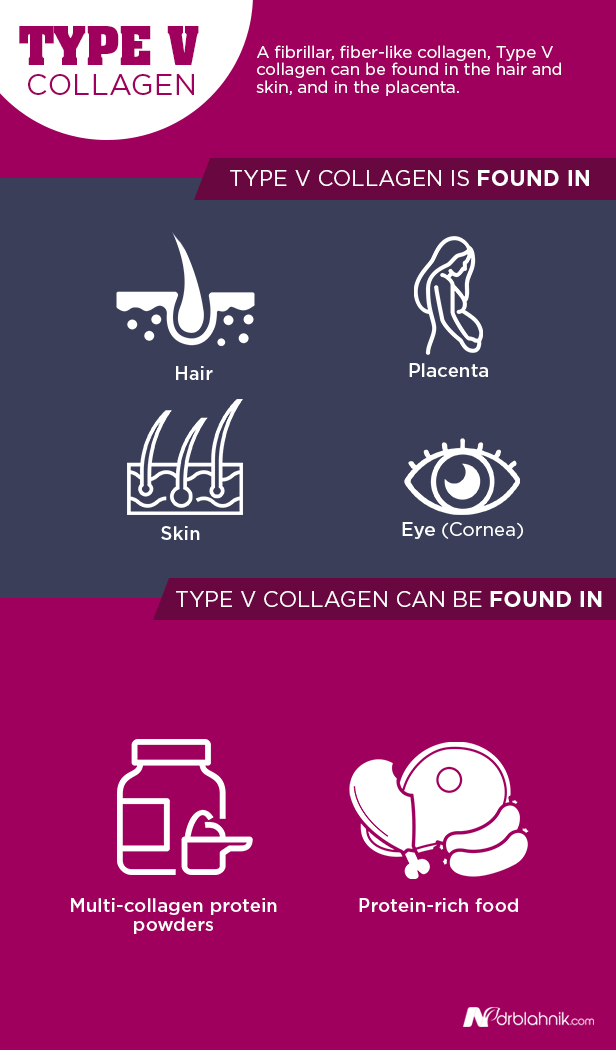
To bolster your Type V collagen levels, you can add the following to your intake:
- Multi-collagen protein powders.
- Protein-rich foods.
It is also worth noting that Type V collagen autoimmunity has an impact on the success of lung transplants, with resistance to the protein causing the body to reject the transplant.
Type X Collagen
Type X collagen is non-fibrillar collagen, and it’s one of two short-chain collagens, along with Type VIII. This type of collagen has less study into it than the first five but seems to be relevant to wound healing, bone healing, and potentially as a biomarker for certain types of colon cancer.
In the body, Type X collagen is found primarily in the joints and plays a role in keeping them healthy. Thus, supplementing with more Type X collagen may help to improve the long-term health of your joints.
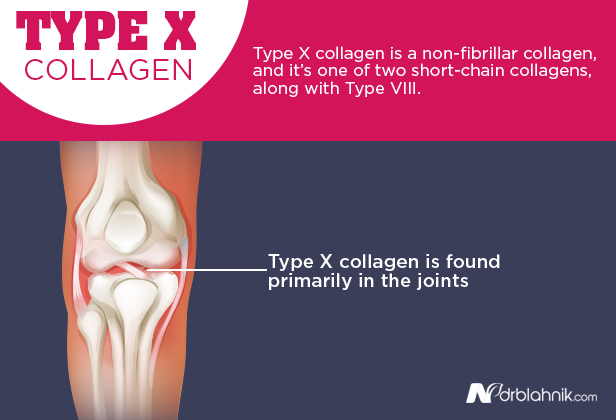
Unfortunately, the largest natural source of Type X collagen is eggshell membranes, which are not an easy dietary source. This means that the best source of Type X is from supplements that have extracted and isolated that collagen for consumption.
Best of the Bunch
While these six collagen variations are not the only ones and only factor for a small fraction of the twenty-eight total variations, they are the six most crucial, according to most medical experts. However, out of these six, only a couple truly shine as the best of the bunch. In terms of benefits and ease of supplementation, Type I and Type II collagen seem to offer the best results and uses out of the six.
Type I collagen is ideal for anti-aging treatments, skin hydration, wound healing, cellulite reduction, and moderate weight loss. This makes Type I collagen the best for the vainer health treatments for keeping your body and skin healthy and youthful.
Type II collagen is best suited for bone and joint health. This means that Type II collagen is the more practical health-boosting protein to ensure your body continues to move and function.
Despite the collagen variation you are looking to imbibe to better your health, there is one universal trait among the supplements you need to be aware of. Any collagens you take must be fully hydrolyzed. Hydrolyzed collagens are smaller and therefore enter the bloodstream faster, so you might reap the benefits sooner rather than later.
The Meat of the Matter
The sheer number of collagen variations in the world means countless slight differences can enhance your body’s health. Out of the twenty-eight we have discovered so far, the five discussed here are among the most important. Each collagen type offers different benefits that are vital to your body and that can be bolstered with the right dietary changes and supplements.
Type I collagen helps keep your skin healthy and assists with wound healing. Type II collagen helps with joints and bones. Type III collagen furthers the healing process of Type I and enhances your muscles. Type IV collagen helps with embryonic development and skin growth. Type V collagen aids with vision and furthers the embryonic development benefits of Type IV collagen.
Not every collagen type is created equal, and each one offers a different facet of physical development and enhancement that helps us function as organisms. While collagen does generate in the body naturally, we can supplement it to help us overcome any issues we have with the aspects of our biology that each type contributes to. If you are concerned about health issues that come from what our natural collagen amount is meant to cover, try to adjust your diet accordingly. Increase your protein intake with beef, chicken, and fish. If you are deeply concerned, seek out supplements that might help boost the collagen type you lack. However, be sure to consult your physician if you have any doubts about supplement intake.

